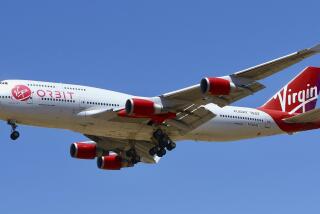Lockheed, Marietta in Tentative Deal on LTV Aerospace Units
- Share via
Lockheed Corp. and Martin Marietta have tentatively agreed to buy and jointly own the aerospace operations of LTV Corp., consisting of an aircraft and missile operation headquartered in Ft. Worth with annual sales of about $1.7 billion, the firms said Monday.
Terms of the deal were not disclosed, but industry sources put the price at about $350 million. Lockheed and Martin would each hold 50% ownership of a new company, called Vought Corp., resurrecting the name of LTV’s founder, Chance Milton Vought.
The sale is a key part of LTV’s bankruptcy reorganization, in which the firm is attempting to reduce its $6.8 billion in liabilities and shore up its severely underfunded pension funds. LTV will retain its money-losing steel-making operations, the nation’s third largest. The aerospace operations have earned a consistent profit.
Lockheed Chairman Daniel Tellep said in an interview that he considers the LTV aerospace operation to be “a solid, profitable company with a good portfolio of programs.” Tellep said that even with the anticipated decline in defense spending, the investment would provide an attractive return.
If the deal is made for $350 million, it would reflect today’s depressed values in the defense industry. The two LTV divisions to be sold generate operating profits of about $100 million annually, according to LTV officials, meaning the sale would be at 3.5 times operating earnings and an even lower multiple in terms of net earnings.
The sale involves:
* An aircraft division that builds the intermediate wing of the B-2 bomber, the engine housings of the C-17 cargo jet and the tail sections of the Boeing 747, 757 and 767.
* A missile division that builds the multiple launch rocket system, the Army tactical cruise missile system and Scout rockets for launching small payloads.
The two divisions employ a total of 13,500 workers.
President Bush’s recent decision to scale back the B-2 bomber program to just 20 planes had been anticipated, Tellep said, and did not diminish the value of the deal. LTV spokesmen said the firm would lay off half of its 3,000 workers on the B-2 this year alone, with completion of the 20th intermediate wing for the B-2 scheduled for 1994.
Tellep said prior statements by Lockheed that it wants to lessen its dependence on defense have been “too terse,” explaining that he hopes to increase non-defense work without shrinking defense work. Lockheed’s non-defense business increased from 26% of revenue to 30% in 1991.
The firm’s goal, he said, is to reduce Defense Department business to 60% of revenue.
Though the Lockheed/Martin deal is expected to be completed, an industry source said he anticipates a competing offer from Washington-based Carlyle Group and France’s Thomson will be submitted directly to the bankruptcy judge overseeing LTV’s reorganization. Such a last-minute bidding war occurred in the sale of another LTV unit, AM General.
Separately, Lockheed reported that it earned $103 million on sales of $2.7 billion in the fourth quarter of 1991, a 4% increase in profit on a 7% decline in sales from the same period last year. The increase in net earnings came despite an increase to 35% in the firm’s effective tax rate from 22% the year earlier.
For all of 1991, the Calabasas-based aerospace firm earned $308 million on sales of $9.8 billion, compared to $335 million in earnings on sales of $9.9 billion in 1990. The firm’s funded backlog of orders rose to $17.1 billion at the end of 1991 from $15.2 billion in 1990.
More to Read
Inside the business of entertainment
The Wide Shot brings you news, analysis and insights on everything from streaming wars to production — and what it all means for the future.
You may occasionally receive promotional content from the Los Angeles Times.











